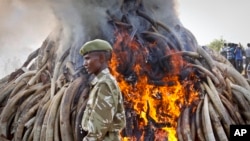Kenya incinerated 15 tons of elephant tusks Tuesday in a symbolic gesture against the illicit ivory trade. The government has promised to destroy all of its remaining ivory stocks as it steps up a fight against poaching.
Kenyan President Uhuru Kenyatta lowered a burning torch to a three-tiered pile of ivory tusks, sending flames and smoke swirling high into the air above Nairobi National Park.
Speaking at the event, which also marked World Wildlife Day, Kenyatta said the burning represents Kenya's commitment to stopping the ivory trade.
“African countries are concerned about the scale and rate of the new threat to our endangered wildlife species. We are committed to combating the menace robustly and persistently until we dismantle the entire vile economy," said President Kenyatta.
Conservationists say Africa loses more than 20,000 elephants each year to illegal poaching, and that the animals could go extinct by the middle of the century if the trend continues.
Ivory trafficking has been driven mostly by demand from Asian consumers who use the material to make jewelry and ornaments.
Kenya first burned some of its ivory stocks in 1989, and held another public burn in 2011. President Kenyatta said Kenya plans to eliminate all of its remaining ivory stocks.
“In order to underline our determination to eradicate poaching, my government shall burn the rest of the stockpile that we have within this year, said Kenyatta.
Kenya Wildlife Service spokesman Paul Udoto said the act of burning ivory is meant to send a message to the world about the value of wildlife.
"We are saying what we have here is priceless, that's the reason we are setting it on fire, because if it had value we would have required this money to do our conservation work but we are saying we place value on our elephants in their wild environment," said Udoto.
China last month instituted a one-year ban on imports of ivory carvings. However, the moratorium does not address the domestic trade within China, which conservationists say fuels demand and provides a cover for illicit international trafficking.
